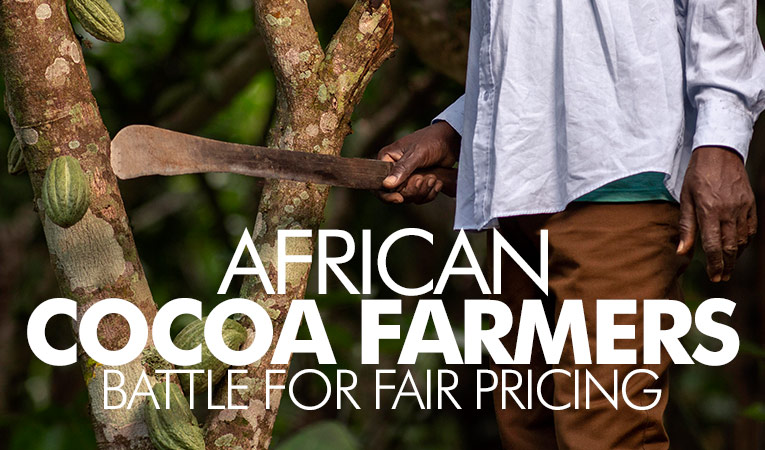African Cocoa Farmers Struggle Despite Record High Prices
26-04-2024

The global cocoa industry stands as a testament to both the sweetness of chocolate and the bitter realities faced by African farmers who cultivate the precious cocoa beans. In recent times, as cocoa prices reach unprecedented highs on the global market, the plight of these farmers remains a pressing issue. This article delves into the multifaceted challenges and opportunities confronting African cocoa farmers, with a focus on regions like Ghana and Ivory Coast. By examining the intricacies of the cocoa supply chain, the impact of climate change, and the role of government policies and international initiatives, we aim to shed light on the complexities of this vital industry.
Understanding the Cocoa Supply Chain:
At the heart of the cocoa industry lies a complex supply chain that spans continents and involves numerous stakeholders. African countries, particularly Ghana and Ivory Coast, dominate cocoa production, accounting for a significant portion of global output. However, despite their central role in the industry, cocoa farmers in these countries often find themselves at the mercy of fluctuating market dynamics and entrenched power imbalances.
The Challenges Faced by African Cocoa Farmers:
African cocoa farmers face a myriad of challenges that threaten their livelihoods and well-being. Climate change poses a significant threat, with rising temperatures, erratic rainfall patterns, and increased incidence of pests and diseases affecting cocoa yields. Farmers like Kingsley Owusu from Ghana's Afigya Kwabre district have experienced firsthand the devastating impact of these environmental changes. Once able to rely on cocoa farming to support their families, many farmers now struggle to make ends meet as their yields decline.
In addition to climate-related challenges, African cocoa farmers grapple with systemic issues within the cocoa supply chain. Limited access to markets, lack of bargaining power, and opaque pricing mechanisms leave farmers vulnerable to exploitation and economic uncertainty. The centralized trading systems in countries like Ghana further exacerbate these issues, as farmers have little control over the prices they receive for their beans.
Government Policies and International Initiatives:
In response to the challenges faced by cocoa farmers, governments and international organizations have implemented various policies and initiatives aimed at improving the livelihoods of farmers and promoting sustainable cocoa production. The Ghana Cocoa Board (COCOBOD), for example, has announced plans to increase the price it pays to cocoa farmers per tonne, in a bid to enhance their income and incentivize continued participation in cocoa farming.
However, critics argue that such measures may not address the root causes of the problem, including the unequal distribution of value along the supply chain and the lack of transparency in pricing mechanisms. Moses Djan Asiedu, board secretary of the West African Cocoa Farmers Organization, has called for greater fairness and equity in the cocoa market, emphasizing the need for policies that empower farmers and ensure they receive their fair share of the profits.
International initiatives such as the living income differential, introduced in 2019, aim to address some of these issues by providing additional compensation to cocoa farmers to offset the costs of production. However, the effectiveness of such initiatives remains questionable, as evidenced by the continued struggles faced by African cocoa farmers.
Opportunities for Innovation and Collaboration:
Despite the challenges confronting African cocoa farmers, there are opportunities for innovation and collaboration that could help transform the industry. Smart farming methods, such as the use of drought-resistant cocoa varieties and sustainable agricultural practices, hold promise for mitigating the impact of climate change and improving yields.
Furthermore, partnerships between governments, international organizations, and private sector stakeholders could help address systemic issues within the cocoa supply chain. By promoting transparency, fair trade practices, and responsible sourcing, these collaborations have the potential to create a more equitable and sustainable cocoa industry.
Conclusion:
In conclusion, the challenges facing African cocoa farmers are complex and multifaceted, but not insurmountable. By addressing issues such as climate change, market access, and pricing transparency, stakeholders across the cocoa supply chain can work together to create a more sustainable and equitable future for cocoa farming in Africa. As consumers, we also have a role to play by supporting initiatives that promote fair trade and responsible sourcing practices. By standing in solidarity with African cocoa farmers, we can ensure that the sweet taste of chocolate is not overshadowed by the bitterness of exploitation and inequality.
Reference: Frontline




